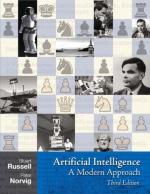|
This section contains 1,275 words (approx. 5 pages at 300 words per page) |

|
Artificial Intelligence (AI) is a field of study based on the premise that intelligent thought can be regarded as a form of computation—one that can be formalized and ultimately mechanized. To achieve this, however, two major issues need to be addressed. The first issue is knowledge representation, and the second is knowledge manipulation. Within the intersection of these two issues lies mechanized intelligence.
History
The study of artificial intelligence has a long history, dating back to the work of British mathematician Charles Babbage (1791–1871) who developed a special-purpose "Difference Engine" for mechanically computing the values of certain polynomial functions. Similar work was also done by German mathematician Gottfried Wilhem von Leibniz (1646–1716), who introduced the first system of formal logic and constructed machines for automating calculation. George Boole, Ada Byron King, Countess of Lovelace, Gottlob Frege, and Alfred Tarski have all significantly contributed to the...
|
This section contains 1,275 words (approx. 5 pages at 300 words per page) |

|



